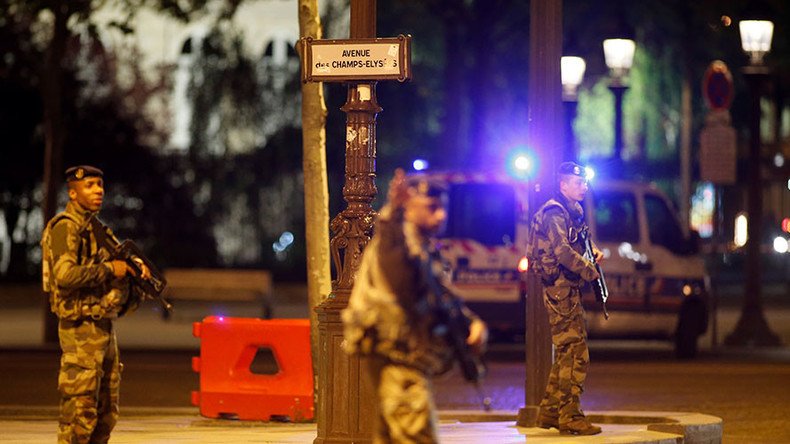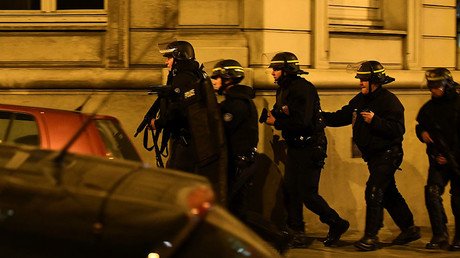Attack ahead of French vote ‘was ghastly inevitability’

What impact could Thursday’s attack in Paris have in France coming so close to the presidential election? Are authorities doing enough to prevent this kind of incident given the suspect was reportedly known to police?
An attack in Paris on Thursday has left one policeman dead and two seriously injured.
French President Francois Hollande has said all the leads point to terrorism in the Champs-Elysees attack.
Following the incident, the leader of the National Front party, Marine Le Pen, has called for the country to restore its national borders and for the government to expel people on terror watch lists.
Prosecutors say they have identified the killer and he was already known to police.
URGENT: Man flagged for having possible links to #ParisShooting turns himself to #Antwerp police – reports https://t.co/um09wurcf6
— RT (@RT_com) 21 апреля 2017 г.
Coleen Rowley, former FBI agent, and whistleblower commenting on the possible impact of the attack on the presidential election said: “Anything that happens or anything that a candidate is able to produce in the last couple of days when things are that close could maybe change the election. It’s hard to say though which way this would play. There have been terrorist attacks before [yesterday] – there have been two or three, I think just in the last several weeks.”
As to whether the attack could have been prevented, she said that the number of people, that police have information about and that may be potential terrorists is so high it is just impossible to put everyone under surveillance.
“For hundreds of years, people thought maybe there would be a way to know who is going to commit a criminal act. With terrorism obviously, it is possible to profile. It is possible to collect a lot of information on a lot of people. That is precisely what has happened – they do have a lot of information on a lot of people. Even the numbers of people that have gone to fight – either in Iraq, or Syria or somewhere else in the Mideast – are so great now that they don’t have the police resources to simply put everyone under 24-hour surveillance. This is the problem – they should have never allowed the number of potential terrorists to rise over 15 and a half years. This is what I and others predicted,” she told RT.
The attack will once again raise fears over open borders in the EU's Schengen zone, says Paul Vallely, retired US army general.
The discussion I had when I was in Paris again a few months ago – that the EU is really disintegrating, and this open border culture, that has been instituted within the Schengen countries there, is not working. You can travel freely through all those countries – nobody checks anything. They travel basically with a pistol or a knife – there is no way to secure these public conveyances, such as trains. There is going to be a very focused concerted effort by the police, and even by the military forces that secure the borders of France.
As for the timing of the attack, that occurred just three days before the first round of the presidential election on Sunday, he said: “You would think that ISIS would be smart enough to know that by doing more radical Islamic terror attacks in Paris that’s going to give credit and support for Marine Le Pen, and I am hoping for one that she does win the election. When I was there two months ago, I was in one of those no-go zones, about 30 minutes North of Paris in Seine-Saint-Denis and it is a horrible situation.”
The French police are doing everything they can, but it’s hard to control crowds of people in the center of the city, according to Eric Margolis, war correspondent, columnist, author.
“The French as I know are doing a maximum effort of getting large numbers of police and security units out on the street rounding up suspects before they can do anything; just being extremely vigilant. But there is only so much the French can do. I’ve been on the Champs-Elysees many times when it’s packed with people. It is very hard to control these crowds,” he told RT.
The French are hated in the Middle East and are a particular target of ISIS, Margolis says.
“The French are hardly involved in the Middle East. In North Africa, where they are waging the small undeclared war against jihadists in Mali there is lots of friction and animosity. The French have said repeatedly that they are going to crack down on any acts of violence, and they will not be influenced by them,” he said.
The political outcome of Thursday’s attack is predictable and will most likely help Marine Le Pen to get more votes in the election, says Max Abrahms, professor of political science.
“When countries are attacked they move to the political right,” he said.
Abrahms says that it’s “upsetting” when attacks are committed by people known to security services as possible extremists.
“When the person is not on the radar I am very forgiving. However, when the person is a known extremist - that is much more upsetting.”
Annie Machon, former MI5 intelligence officer, noted that this was not the first time an alleged attacker was known to security services.
“Yet again, we see this time and time again. In all these European attacks these people are always on the radar of the security services, but nothing is done to stop them,” she said.
In hew view, “there is a sort of ghastly inevitability that some sort of attack was going to be attempted just ahead of the presidential election.”
“It appears that the authorities in France seem to have been aware of this. They have been reported to have been putting measures in place to protect the polling stations during the election,” she told RT.
Machon is confident that this kind of attack can be prevented.
“And not just me, but many other intelligence whistleblowers including the former technical director of the NSA William Binney,” she added. “These mass surveillance programs that have been developed since 9/11 mean the intelligence agencies are drowning in a tsunami of information, which means they can’t then target their resources effectively against those who are highlighted as being a real danger to our society. Once you have identified them, you use a blend of different technics to fully monitor them; to try and gather intelligence; to get an understanding of what their potential intentions might be. That is just nature intelligence work,” she said.
The statements, views and opinions expressed in this column are solely those of the author and do not necessarily represent those of RT.













